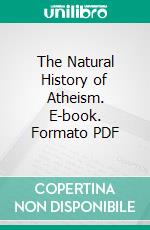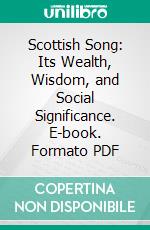John Stuart Blackie eBooks
eBooks di John Stuart Blackie
The Natural History of Atheism. E-book. Formato PDF John Stuart Blackie - Forgotten Books, 2017 -
A bold piece of work, The Natural History of Atheism by John Stuart Blackie explores the constructs of theism, atheism and polytheism in minute detail. Spread across six chapters, the book initially treads through a section called Presumptions which postulates the underlying premise of the author. John Stuart Blackie effortlessly weaves an engrossing narrative against the backdrop of different religious beliefs. The deliberations transcend cultures and borders to rope in Greek polytheism and Buddhism, providing a number of riveting causes for atheism, which unfold throughout the length of the book. The The Natural History of Atheism is a great insight in to why certain groups do not believe in the existence of God - For John Stuart Blackie these reasons are underpinned by traits that include ignorance, pride and moral turpitude among others. The last section of the book dwells on atheism due to reaction and a disbelief in Christianity. The author is able to successfully distinguish between different contexts and settings to provide logical explanations for rise of atheism across multiple religions.The Natural History of Atheism is hard hitting and straightforward in its approach. With an already well-established professor and man of letters as its author this work is full of piquant wit, yet the narrative is decidedly structured, as John Stuart Blackie unfolds his most cogent arguments at the right moments. If not for tracing the roots of atheism and its underlying causes, readers would be pleased with The Natural History of Atheism by John Stuart Blackie for its deep insights into different religions. This book will cater to a larger audience as it is premised on universal issues in the realm of religion and belief systems.
Scottish Song: Its Wealth, Wisdom, and Social Significance. E-book. Formato PDF John Stuart Blackie - Forgotten Books, 2017 -
The title which this little volume bears, sufficiently explains the reason of its appearance, and whatever small claims it may be able to advance for originality in a theme so often and so ably handled by experts in the folk-lore and the popular music of their country. I have no pretensions either to the scientific knowledge or to the curious literary research which might enable me to compete with these men of Skill, and to share in any part of the praise which they have so justly earned; I only thought I might do some good, in an age urged by various stimulating forces to seek after what is new rather than to hold by what is true, if I should present, in a sort of dramatic totality, the wealth of moral, intellectual, and aesthetical nutriment of the best kind that lies stored in our heritage of national song. My task, therefore, was simply one of collection and.

